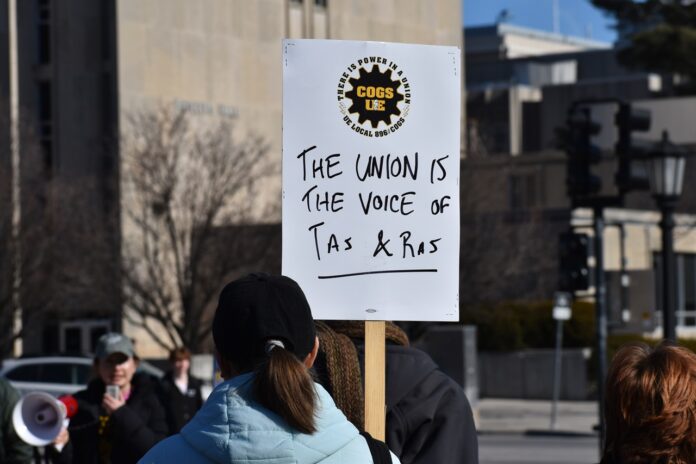University of Iowa graduate student worker union COGS will be headed to a closed bargaining session with the Iowa Board of Regents Feb. 20 to negotiate a pay raise for the 2025-2027 academic year. Via their attorneys, the board offered a 6% pay raise at an open bargaining session Feb. 6, one percent higher than […]
University of Iowa graduate student worker union COGS will be headed to a closed bargaining session with the Iowa Board of Regents Feb. 20 to negotiate a pay raise for the 2025-2027 academic year.
Via their attorneys, the board offered a 6% pay raise at
an open bargaining session Feb. 6, one percent higher than the minimum requirement of 5%.
“To my knowledge, this is the first time since 2017 that the Board of Regents or the State of Iowa has proposed a wage increase higher than the maximum that an arbitrator could award to the Union,” said UE organizer Greg Cross, via the COGS newsletter. In 2017, the Iowa legislature dismantled the Iowa Public Employment Relations Law – Chapter 20 of the Iowa Code – via House File 291 and Senate File 213, restricting the wage increase an arbitrator can award in an impasse arbitration.
However, the union rejected the offer.
Citing unlivable wages that do not keep pace with inflation, COGS has been campaigning for a 25% pay raise for the next two years.
Under
the current bargaining agreement, which expires in June, the minimum salary is set at $21,969 for a 50% academic year appointment – which translates to 20 hours a week per semester. Meanwhile, employees with a 50% fiscal year appointment will receive at least $26,841.
Along with a 25% pay raise, the union is also demanding that the first pay period start Aug. 1 instead of September, providing a financial cushion for graduate students beginning new appointments, as they work throughout August.
“This leaves many students in a state of severe financial burden, and many of them start their appointments already in debt,” Gage Liddiard, neuroscience research assistant, said in the newsletter. “Unsurprisingly, workers need places to live in Iowa City. The renting cycle in Iowa City turns over at the end of July through the first week of August. This means that the cost of an apartment’s security deposit, rent, and any associated moving and travel costs all come due well before a grad student would see even a single cent from the University. This affects the overwhelming majority of grad workers.”
Graduate workers would also like their contract to highlight and clarify the university’s paid time off policy. Many student employees are not aware of their rights in that regard, said Regina Napolitano, rhetoric teaching assistant.
Questions put to the board’s attorneys were not satisfactorily answered, the newsletter said, and the union expressed disappointment that the regents were not present, with one COGS member calling it “disrespectful.”





